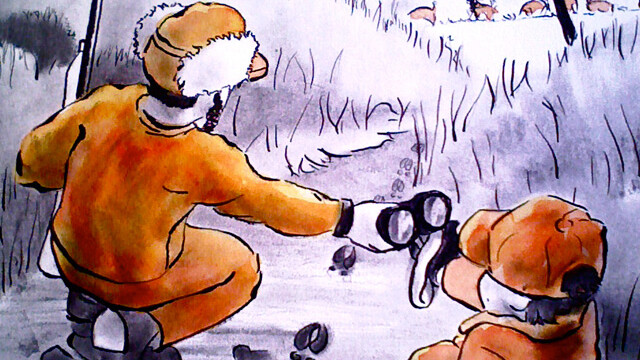On the Hunt
killing some basic hunter stereotypes
Mike Paulus, illustrated by Ian Kloster

Raise your hand if your family hunts. OK, if you come from a family of treasure hunters, put your hand down. And if your family just loves a good Easter egg hunt, put your hand down. And if your last name is Hunt (I’m looking at you, Helen), put your hand down. Hopefully, the rest of you hand-raisers have family members who hunt animals – whitetail deer in particular.
If so, then you are just like me. I have many deer hunters in my family and, although it’s only during rifle season, I like to hunt, as well. Stop laughing.
Since this activity resides at the top of a short list of honest-to-god manly activities with which I have experience, I hold it dear to my heart. Without it, my résumé of machismo would only include “building retaining walls” and “backing up a trailer.”
I’ve hunted for as long as I was old enough to qualify for hunter’s safety courses, and since this activity resides at the top of a short list of honest-to-god manly activities with which I have experience, I hold it dear to my heart. Without it, my résumé of machismo would only include “building retaining walls” and “backing up a trailer.” And while my résumé doesn’t reflect it, I haven’t actually done either of those things in damn near a decade.
So if I hear someone making snide remarks about hunters, I take it personally. When I see hunting stereotypes in movies and on TV, I roll my eyes. For example: the image of a dead deer tied to a car hood. That’s just stupid.
In over two decades of hunting, I have never bore witness to a deer strapped onto the front of a car. It makes no sense at all. I’ve occasionally seen deer strapped to the top of a vehicle, but I highly doubt that method of carcass transport is the driver’s first choice – they just didn’t have any other place to put it.
Ninety percent of the hunters I see have a pickup truck. If you’re not familiar, a pickup truck usually has some sort of handy storage area positioned near the rear of the vehicle able to comfortably accommodate a whitetail deer.
To anyone who doesn’t like pulling up behind a pickup truck with a dead deer or two in the back ... sorry about that. Until you’ve registered your deer, you’re actually required by law to keep it visible. This helps cut down on poaching.
 Personally, I’ve never met someone so proud of the buck they’ve killed that they’ve displayed it on the hood of their car like some sort of gruesome parade float. I’ll assume that, at some point in the history of hunting in Wisconsin, it has happened. But jeez, so have earthquakes.*
Personally, I’ve never met someone so proud of the buck they’ve killed that they’ve displayed it on the hood of their car like some sort of gruesome parade float. I’ll assume that, at some point in the history of hunting in Wisconsin, it has happened. But jeez, so have earthquakes.*
Mostly I’ve met hunters eager to tell the story of how they shot their deer. And beyond having their picture tacked to the local Holiday station’s “buck board,” most hunters really don’t go looking for attention. I mean, we’re talking about Wisconsinites, here. Too much attention makes us stare at our shoes and change the subject.
I’m not saying hunters can’t be pompous jerks. They can. But you can find a group of pompous jerks in any walk of life. They’re usually gathered around a keg of light beer calling each other “brah.” Hunters are no different. They’re just like you or anyone else. They just happen to own a fabulous blaze orange outfit or two.
On the other side of the stereotypical hunter spectrum is the “noble woodsman staying connected to the ways of the past.” I have yet to meet many of these people, either. I think most hunters are noble folk staying connected to family traditions and responsible food sources, while the image of a hunter paying some sort of homage to the natural world as their ancestors did, while accurate for some people, is mostly a character type you see in the movies.
You just can’t avoid the fact that hunters are hunting in large part for sport and camaraderie. I believe there’s a good dose of spiritual satisfaction mixed in there somewhere, but it’s not something that gets talked about.
The hunters I’ve met, certainly the ones I grew up with, are neither carcass-displaying braggarts nor vision-questing nature-nuts. They’re honest people. They’ve gained an understating of animals and ecosystems that’s deeper than most, and they’ve got a stake in protecting those things. They kill, but they don’t take it lightly.
And unfortunately, their numbers are shrinking. Recent statistics show a steady decline in Wisconsin’s active hunters over the past decade. I hope that stops. Besides their important role in controlling the state’s deer population, they help define us as a people. Without them, we are less nuanced, less unique.
Hunters are just part of what makes Wisconsin Wisconsin.

